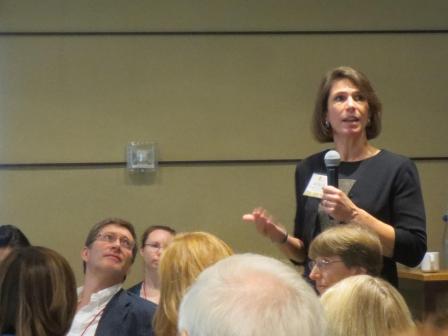Balancing Optimal Nutrition with Sustainability
Several dozen of the world’s leading nutrition experts recently gathered to hammer out a consensus on the ideal diet.
Monica Reinagel, MS, LD/N, CNS
Listen
Balancing Optimal Nutrition with Sustainability
I recently attended a conference at which some of the world’s leading nutrition experts were challenged to arrive at a consensus about what the healthiest diet is for humans. When I saw the list of attendees, I knew it was going to be a spirited and interesting discussion.
Among the invitees were some of today’s most well-known proponents of the vegan diet, including Dr. Neal Barnard, founder of the Physicians Committee for Responsible Medicine and Dr. Dean Ornish, founder of Preventive Medicine Research Institute. Also on the docket was Dr. Boyd Eaton, who was one of the first to propose that our diet should mimic the diet eaten by our hunter-gatherer ancestors, including plenty of animal protein. I was very curious to see how these seemingly irreconcilable points of view could be united into a consensus.
Introducing the Eco-Paleo Diet
Much to my surprise, however, the question of whether or not we should eat meat was not a major bone of contention at this meeting. Although Dr. Eaton still believes that the optimal diet for humans would contain meat, he now believes that issues of sustainability and planetary health have become even more pressing—and that eating large amounts of red meat is simply not compatible with a healthy planet.
Dr. Eaton now describes himself as a Paleo-Realist, and advocates a diet that’s high in protein but primarily from plant-based sources. Even apart from the sustainability issue, however, Eaton disagrees with later Paleo popularizers such as Robb Wolf and Loren Cordain on the role of grains and legumes. Eaton argues that these foods were available to and consumed by Paleolithic humans and that there’s no need to exclude them from the diet.
Click here to listen to my complete interview with Dr. Eaton.
Chewing the Fat
The issue that proved most resistant to consensus turned about to be the question of how much fat we should be eating. Both Dr. Ornish and Dr. Barnard argued that a very low-fat, plant-based diet is the ideal approach for the prevention and treatment of heart disease, cancer, diabetes, and obesity.
Click here to listen to my complete interview with Dr. Ornish on his proven program for reversing heart disease.
But we also heard from the world’s leading experts on the Mediterranean diet, along with several luminaries from the Harvard School of Public Health and the Dietary Guidelines Advisory Committee, all of whom argued that the Mediterranean diet pattern, which gets 35- 40% of its calories from healthy fats, is the ideal.
Although the group did ultimately publish an 11-point consensus statement, the experts ultimately had to agree to disagree on the question of how much fat the ideal diet should contain.
Following the conference, Dr. David Katz, who was one of the primary organizers of the event, published an eloquent essay in which he argues that this divergence of opinion on the question of fat is not as big as you might think and, either way, is focusing on the wrong issue. You can read his entire article here. (And, by the way, the “journalist” he describes in his piece is, in fact, me—and the email from a listener that started the whole argument is from one of you!)
Finding Common Ground
Everyone at the meeting was in lock-step on the issue of sustainability—that we cannot separate human health from the health of the planet.
Obviously, the conference did not end with everyone singing exactly the same tune. But I agree with Dr. Katz that the things about which we agreed are much more important than the remaining differences.
For example, everyone at the meeting was in lock-step on the issue of sustainability—that we cannot separate human health from the health of the planet. Any discussion of an optimal diet must account for the impact of dietary choices on the environment and on the other life forms we share the planet with, as well as the nutritional impact on humans. This, perhaps more than any other factor, led to widespread consensus on the desirability of a diet based mostly, if not entirely, on plants.
The other key point of agreement was that a healthy and sustainable diet—whether it’s vegan, Paleo, low fat, low carb or anything in between—must be built on nutrient-dense, minimally processed foods. No matter how you slice it, there’s not a lot of room for highly-processed food in a healthy diet. And when we focus on getting our nutrition from a balanced variety of real foods, the individual nutrients tend to take care of themselves.
Eating Well
A final point of consensus was that you don’t need to sacrifice enjoyment or excitement in order to eat well. A healthy diet can be good for your body, good for the planet, easy on the wallet, and unapologetically delicious. To prove the point, check out the recipe archives at Oldwaypt.org for some amazing and easy recipes from a variety of traditional cuisines around the world, many of which we enjoyed during the conference.
My thanks to Dr. Katz and Oldways for inviting me to participate in this extraordinary event. I look forward to sharing more insights and interviews from the conference with you in weeks to come.
I’d also like to hear from you: Did any of this come as a surprise? What do you see as the biggest unanswered questions about health and nutrition. Post your comments below or on the Nutrition Diva Facebook page.
Image courtesy of Lew Harriman at Oldways.

